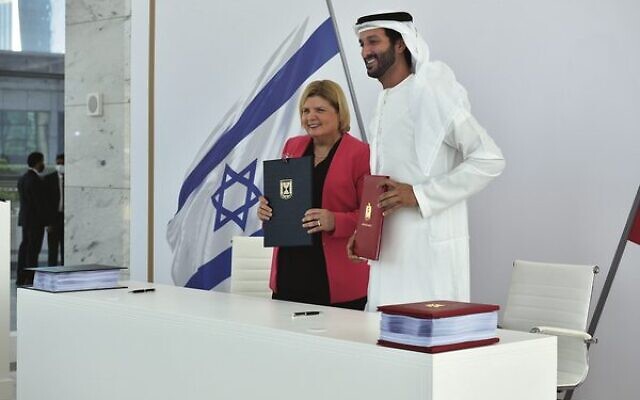Israel, UAE ink ‘groundbreaking’ free trade deal
The UAE hopes to generate over a $1 trillion in trade with Israel over the next decade.

Israel and the United Arab Emirates signed a comprehensive, “groundbreaking” free trade agreement on Tuesday in a bid to boost economic ties between the two countries, as trade hit about $2.5 billion in the less than two years since the US-brokered Abraham Accords were inked, according to recent estimates.
Israeli Minister of Economy and Industry Orna Barbivai was in Dubai on Tuesday morning to sign the agreement with Emirati Minister of Economy Abdulla bin Touq Al-Marri, who last year said that the UAE hopes to generate over a $1 trillion in trade with Israel over the next decade.
The terms of the agreement were finalised last month in Jerusalem with Emirati Minister of State for Foreign Trade Thani bin Ahmed Al-Zeyoudi.
The free trade agreement covers regulation, customs, services, government procurement, e-commerce and protection of intellectual property rights.
Some 96 per cent of products traded between the countries, including food, agriculture, cosmetics, medical equipment and medication, will be exempt from customs duty, according to the deal. A number of products will be exempt immediately, while others will gradually be granted exemptions.
In January, Israel’s cabinet approved a joint Israel–UAE R&D fund to support tech projects involving Israeli and Emirati companies.
Speaking from Dubai on Tuesday, Barbivai hailed the “historic importance” of the deal for economic relations between Israel and the UAE, noting that it was the first, full free trade agreement between the Jewish state and an Arab-majority country.
Barbivai said the deal was a “groundbreaking move” for Israel and the UAE that will also serve as an “inspiration for the region” and will “generate unlimited opportunities for business, for entrepreneurs from both countries” to strengthen economic ties.
“Together we will remove barriers and promote comprehensive trade and new technologies, which will form a solid base for our joint path, will benefit citizens, and make it easier to do business,” Barbivai said on Monday, ahead of the signing ceremony.
Israel’s ambassador to the UAE, Amir Hayek, tweeted “mabruk” – congratulations in Arabic – alongside a photograph of Emirati and Israeli officials holding documents at a signing ceremony in Dubai.
Emirati ambassador to Israel Mohamed Al-Khaja called the agreement “an unprecedented achievement”, saying it would benefit both countries, and thanking the head of Israel’s Foreign Trade Administration, Ohad Cohen, for spearheading the efforts.
“Israel & the UAE just signed a historic Free Trade Agreement – the first of this scope to be signed between Israel & an Arab state,” Prime Minister Naftali Bennett tweeted after Tuesday’s signing ceremony in Dubai.
Al-Marri, the Emirati Minister of Economy, said on Tuesday that the deal “will create a new paradigm in the region” and “accelerate economic growth and strengthen the common belief that the only way to build sustainable economies in a complex world is together”.
The free trade agreement “can prove to nations and governments around the world that collaboration and dialogue are the best ways to turn challenges into opportunities”.
Al-Zeyoudi also hailed the “new era of trade and investment” in the region and said the “comprehensive agreement between the two countries will accelerate economic activity” while creating opportunities for research and development, “as well as new investments in agricultural technology, renewable energy and advanced technologies – areas of importance to both countries”.
Existing Israel–UAE trade was estimated at an overall $2.5 billion since the signing of the 2020 Abraham Accords, Al-Zeyoudi said in Davos last week. Over $1 billion of that sum was recorded in trade in the first quarter of 2022, he said.
Al-Zeyoudi said that in 2023-2024, trade between the two countries is forecast to reach $5 billion.
TIMES OF ISRAEL

comments